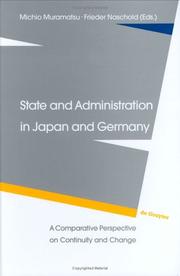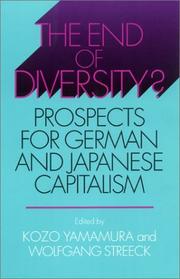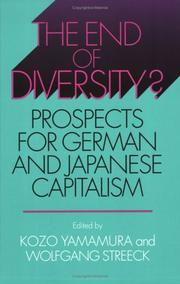| Listing 1 - 9 of 9 |
Sort by
|
Book
ISBN: 9781501731846 Year: 2018 Publisher: Ithaca, NY
Abstract | Keywords | Export | Availability | Bookmark
 Loading...
Loading...Choose an application
- Reference Manager
- EndNote
- RefWorks (Direct export to RefWorks)
Digital
ISBN: 9781501731846 Year: 2018 Publisher: Ithaca, N.Y. Cornell University Press
Abstract | Keywords | Export | Availability | Bookmark
 Loading...
Loading...Choose an application
- Reference Manager
- EndNote
- RefWorks (Direct export to RefWorks)
Book

ISBN: 9781501733147 Year: 2019 Publisher: Ithaca, NY
Abstract | Keywords | Export | Availability | Bookmark
 Loading...
Loading...Choose an application
- Reference Manager
- EndNote
- RefWorks (Direct export to RefWorks)
Digital

ISBN: 9781501733147 Year: 2019 Publisher: Ithaca, N.Y. Cornell University Press
Abstract | Keywords | Export | Availability | Bookmark
 Loading...
Loading...Choose an application
- Reference Manager
- EndNote
- RefWorks (Direct export to RefWorks)


ISBN: 9783110868951 9783110144628 Year: 2013 Publisher: Berlin ;; Boston De Gruyter
Abstract | Keywords | Export | Availability | Bookmark
 Loading...
Loading...Choose an application
- Reference Manager
- EndNote
- RefWorks (Direct export to RefWorks)
Book

ISBN: 0801451515 0801478278 1322503893 0801467632 9780801467639 0801467624 9780801451515 9780801478277 9780801467622 9781322503899 Year: 2013 Publisher: Ithaca, NY
Abstract | Keywords | Export | Availability | Bookmark
 Loading...
Loading...Choose an application
- Reference Manager
- EndNote
- RefWorks (Direct export to RefWorks)
The Great Recession and its aftershocks, including the Eurozone banking and debt crisis, add up to the worst global economic crisis since the Great Depression of the 1930's. Although economic explanations for the Great Recession have proliferated, the political causes and consequences of the crisis have received less systematic attention. Politics in the New Hard Times is the first book to focus on the Great Recession as a political crisis, one with both political sources and political consequences. The authors examine variation in crises over time and across countries, rather than treating these events as undifferentiated shocks. Chapters also explore how crisis has forced the redefinition and reinforcement of interests at the level of individual attitudes and in national political coalitions. Throughout, the authors stress that the Great Recession is only the latest in a long history of international economic crises with significant political effects-and that it is unlikely to be the last. Contributors: Suzanne Berger, MIT; J. Lawrence Broz, University of California, San Diego; Peter Cowhey, University of California, San Diego; Peter A. Gourevitch, University of California, San Diego; Stephan Haggard, University of California, San Diego; Peter A. Hall, Harvard University; Miles Kahler, University of California, San Diego; Peter J. Katzenstein, Cornell University; Ikuo Kume, Waseda University; David A. Lake, University of California, San Diego; Megumi Naoi, University of California, San Diego; Stephen C. Nelson, Northwestern University; Pablo Pinto, Columbia University; James Shinn, Princeton University
POLITICAL SCIENCE --- Political Economy --- Global Financial Crisis, 2008-2009 --- World politics --- International economic relations --- Business & Economics --- Economic Theory --- Political aspects --- Political aspects. --- Global Economic Crisis, 2008-2009 --- Subprime Mortgage Crisis, 2008-2009 --- Financial crises --- Global Financial Crisis (2008-2009) --- E-books


ISBN: 150171144X 9781501711442 0801440882 9780801440885 0801488206 9780801488207 Year: 2018 Publisher: Ithaca, NY
Abstract | Keywords | Export | Availability | Bookmark
 Loading...
Loading...Choose an application
- Reference Manager
- EndNote
- RefWorks (Direct export to RefWorks)
After the devastation of World War II, Germany and Japan built national capitalist institutions that were remarkably successful in terms of national reconstruction and international competitiveness. Yet both "miracles" have since faltered, allowing U.S. capital and its institutional forms to establish global dominance. National varieties of capitalism are now under intense pressure to converge to the U.S. model. Kozo Yamamura and Wolfgang Streeck have gathered an international group of authors to examine the likelihood of convergence-to determine whether the global forces of Anglo-American capitalism will give rise to a single, homogeneous capitalist system.The chapters in this volume approach this question from five directions: international integration, technological innovation, labor relations and production systems, financial regimes and corporate governance, and domestic politics. In their introduction, Yamamura and Streeck summarize the crises of performance and confidence that have beset German and Japanese capitalism and revived the question of competitive convergence. The editors ask whether the two countries, confronted with the political and economic exigencies of technological revolution and economic internationalization, must abandon their distinctive institutions and the competitive advantages these have yielded in the past, or whether they can adapt and retain such institutions, thereby preserving the social cohesion and economic competitiveness of their societies.
Capitalism --- Japan --- Germany --- Economic policy.
Digital

ISBN: 9780801467639 9780801478277 Year: 2013 Publisher: Ithaca, N.Y. Cornell University Press
Abstract | Keywords | Export | Availability | Bookmark
 Loading...
Loading...Choose an application
- Reference Manager
- EndNote
- RefWorks (Direct export to RefWorks)


ISBN: 9781501711442 9780801488207 Year: 2018 Publisher: Ithaca, N.Y. Cornell University Press
Abstract | Keywords | Export | Availability | Bookmark
 Loading...
Loading...Choose an application
- Reference Manager
- EndNote
- RefWorks (Direct export to RefWorks)
| Listing 1 - 9 of 9 |
Sort by
|

 Search
Search Feedback
Feedback About UniCat
About UniCat  Help
Help News
News